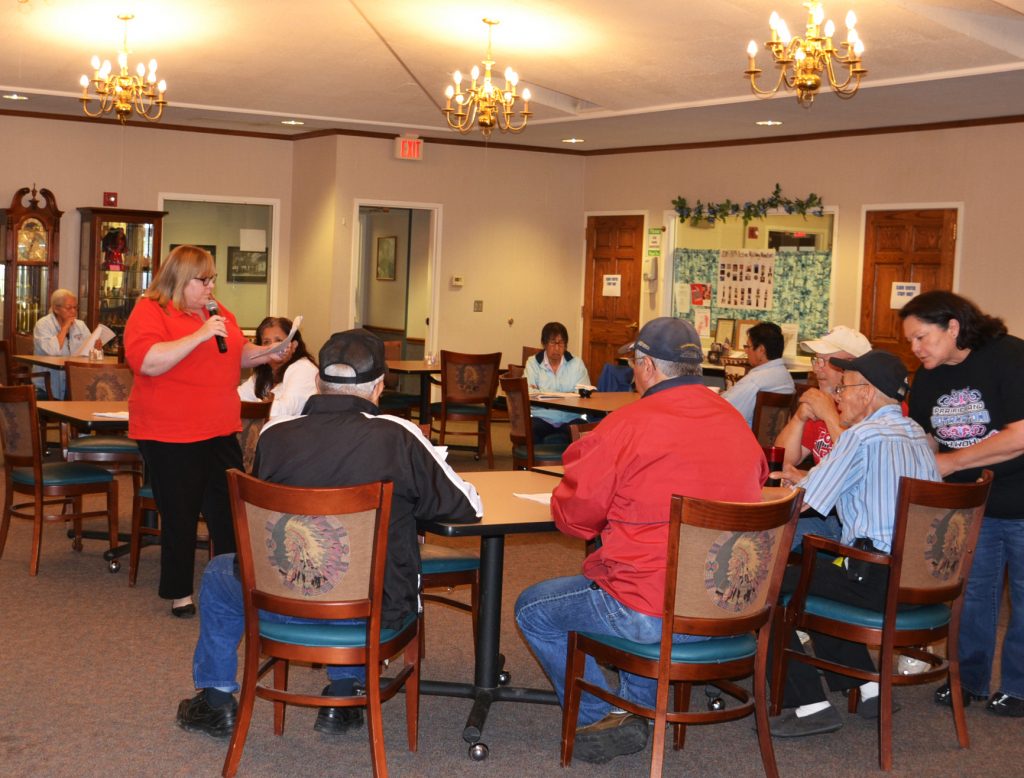 Andrea Bozarth presents information on the signs and prevention of identity theft at the Elders Center.
Andrea Bozarth presents information on the signs and prevention of identity theft at the Elders Center.July 15, 2016 –
The Tribal Victim Service department sponsored a free presentation on Identity Theft presented by Andrea Bozarth of Community Outreach for AARP of Kansas this Wednesday, June 13, 2016 at the Elders Center. Bozarth spoke to a crowd of over 20 community members about the signs and prevention of identity theft.
Bozarth relayed that identity theft continues to be the United States fastest growing crime and more than 85 million people have had their identities compromised based on information sourced to the firm Legal Resources.
The best bet for safekeeping your identity is to know how your information may be breached. Employ prevention measures and keep an eye on your credit score. Every American is allowed to check their credit score for free every 12 months from each of these three credit reporting companies: Experian, TransUnion and Equifax. To get started visit www.annualcreditreport.com, the only source for free credit reports authorized by Federal law.
The main source of identity theft is through an individual’s social security number. When a thief gains access to a social security number they can wreak havoc in multiple ways. They can file bogus tax returns, open fake accounts, and gain access to and drain real accounts including credit cards, bank and savings accounts. Other types of identity theft occur through your driver’s license, criminal (such as someone else providing your name to a law enforcement officer), identity cloning and synthetic which is a combination of various thefts to create multiple identities.
Here is a list of ways financial identity theft can occur:
- Using a “change of address” form at the post office
- Stolen mail/purse/wallet
- Stolen personal information from home files
- Dumpster diving
- Shoulder surfing (looking over someone’s shoulder in a public place while critical information is exposed)
- Skimming
- Phishing (sending out fake email to elicit a response from unsuspecting consumers)
- Vishing (fraudulent phone calls made to sound like a reputable business in order to obtain personal information)
- Smishing (sending out fake text messages to elicit a response)
- Pharming (malicious code installed on a computer redirects clicks made on a real website to a fraudulent website without consent or your knowledge)
- Keylogging (the use of a computer program to record keystrokes made by a computer user)
- Trojan horses/computer viruses
- Check washing
Keeping your information secure at all times is the number one way to keep your identity safe. Here are a few key steps for prevention of theft:
- Do not leave your personal information in your car, even if your doors are locked. This includes mail, wallets, purses, cell phones, laptops, tablets or anything that may give access to vital information
- Always use passwords for your accounts BUT do not use the same password for all accounts and do not store passwords on your cell phone
- Shred all billing statements, medical information, promotional offers, old credit cards or any other document that may give access to vital information
- Restrict your use of public wi-fi, do not access account information while using public wi-fi, limit the use of Bluetooth in public places
- Opt out from direct marketers, through the use of the No Call List, No Mail List, No Email List and do not use prescreened credit offers
Here are a few signals to alert you to possible identity theft:
- Your bills stop coming
- You acquire “new” bills you were not aware of
- You are denied credit or insurance
- You begin to receive calls from debt collectors
These are steps you can take if you feel your identity has been compromised:
- Close accounts immediately
- Place a fraud alert
- File a police report
- File a complaint with the Federal Trade Commission (FTC), www.consumer.gov/idtheft
